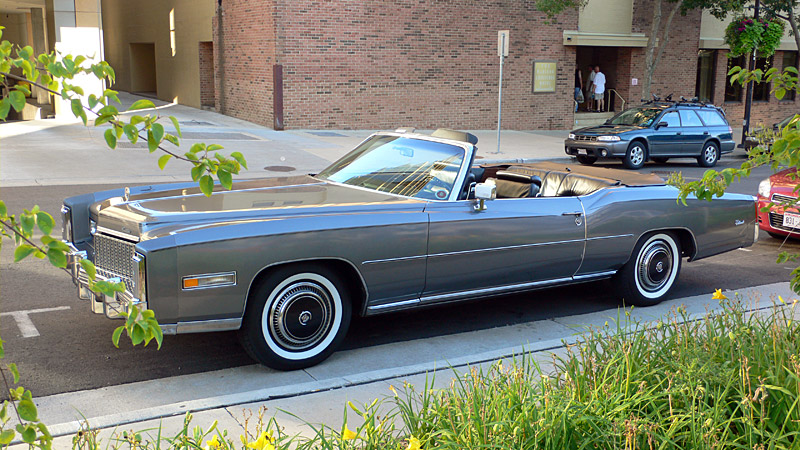
More photos here. [N 37 13.027′ W 112 58.064′]
Monthly Archives: July 2006
Southwest Utah Trip: Bryce Canyon National Park [N 37 36.249′ W 112 09.396′]

Many more photos here. [N 37 36.249′ W 112 09.396′]
Land Yachts: Classic 1970’s Cadillac Eldorado Convertible
I walked past this classic, 1970’s Eldorado on my way to the Farmer’s Market this morning:
More on the Eldorado.
The Friday Line: Top 10 2006 Governor’s Races
7. Wisconsin: Yes, we know about this poll, which showed Gov. Jim Doyle (D) ahead of Rep. Mark Green (R) by 13 points. But the numbers were greeted with skepticism, even by many Democrats. (The poll should be taken with a grain of salt for several methodological reason — it was in the field for an unusually long time and tested adults rather than registered or likely voters.) Ethics questions continue to hover around Doyle’s administration, and typically reliable Democratic base groups — the labor community and black voters to name two — are not terribly excited about helping the incumbent win a second term. Make sure to read Post politics dean David Broder’s take on this race. (Previous ranking: 5)
Concerts on the Square Photos
Another great evening for the Wisconsin Chamber Orchestra’s Concerts on the Square.


Two more photos can be seen here and here. photos taken by our children
Data Miners Dig a Little Deeper
Michelle Kessler & Byron Acohido:
When customers sign up for a free Hotmail e-mail account from Microsoft, they’re required to submit their name, age, gender and ZIP code.
But that’s not all the software giant knows about them.
Microsoft takes notice of what time of day they access their inboxes. And it goes to the trouble of finding out how much money folks in their neighborhood earn.
Why? It knows a florist will pay a premium to have a coupon for roses reach males 30-40, earning good wages, who check their e-mail during lunch hour on Valentine’s Day.
Microsoft is one of many companies collecting and aggregating data in new ways so sophisticated that many customers may not even realize they’re being watched.
FBI Plans New Net-Tapping Push
The FBI has drafted sweeping legislation that would require Internet service providers to create wiretapping hubs for police surveillance and force makers of networking gear to build in backdoors for eavesdropping, CNET News.com has learned.
FBI Agent Barry Smith distributed the proposal at a private meeting last Friday with industry representatives and indicated it would be introduced by Sen. Mike DeWine, an Ohio Republican, according to two sources familiar with the meeting.
Sensenbrenner on Immigration
In recent weeks, Mr. Sensenbrenner has refused to yield on anything, derided what he calls the “amnesty” of the Senate bill and warned that he is willing to walk away without a compromise. He says his views have been influenced by the flood of immigration-related cases coming through his office and what he sees as the failure of previous immigration reform efforts he has worked on.
He is known as one of the toughest negotiators in Congress, which invites another canine metaphor from a colleague. “Sensenbrenner is a pit bull,” says Representative Ric Keller, a Florida Republican on the Judiciary Committee. “And the Senate negotiators he’s up against are wearing Milk-Bone underwear.”
Sensenbrenner has been a powerful friend of many Non-Wisconsin special interests such as the recording industry.
Hilary Rosen Gets DRM Religion?
Obviously, Apple has a business strategy that says “proprietary” works for them. The record companies, I think, have tried to convince Apple to open up their system. I don’t think that’s been successful. The choice now is to either go unprotected so everybody has the same shot and the market expands, or to continue down what I think is an unfriendly path for consumers and the industry, because I don’t think it’s growing as fast as it can.
I understand there’s a rabid philosophy on both sides of this to protect or not to protect … and I actually am not that black and white about it. I think if people want to protect their content, and want to have a DRM or a business model that limits its distribution, that’s okay. If others don’t want to, that’s okay too. That’s why I like Creative Commons. It’s all about choice. What I have focused on is what will most dramatically expand the music market at a time when device choices feel so limited and the service side is so underutilized.
Honda Plans Turbodiesel for US
John Watts, manager of Honda’s U.S. product planning, said Honda plans to introduce a clean-burning, 2.2-liter turbodiesel in the United States within three years.
“That 2.2 could probably crank out about 200 horsepower and about 220 (pounds-feet of) torque at little rpm,” he said at a press event here. “Vehicles like the Pilot (SUV) and Odyssey (minivan) are too big for a four-cylinder.”

